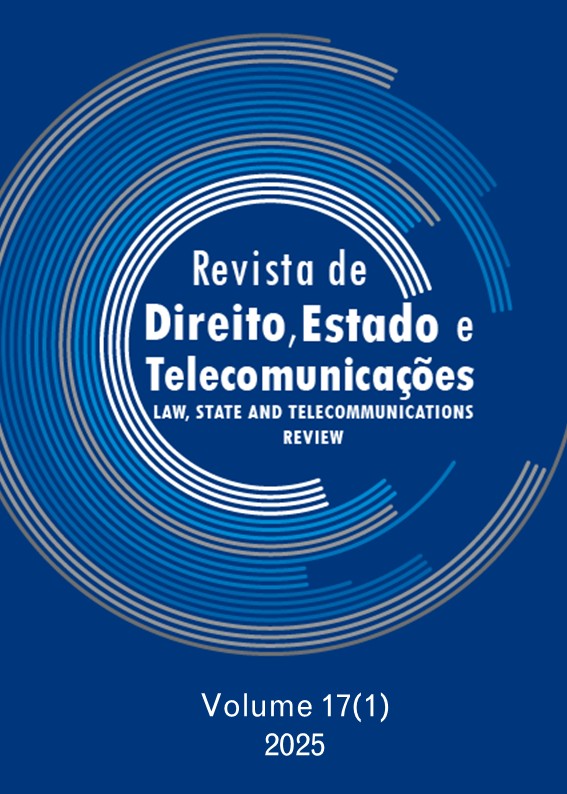Imagined Citizenship
Exploring Rohingya’s Digital Ownership, Identity and Action in Southeast Asia
DOI:
https://doi.org/10.26512/lstr.v17i1.54280Parole chiave:
Social Identity Theory. Rohingya. Citizenship. Inclusion. Digital.Abstract
[Purpose] To analyze the imagined citizenship of the Rohingya through their active digital participation in Southeast Asia, demonstrating how they use technology to communicate abuses, document events, and interact with mainstream media, thus forming their own identity and inspiring digital action.
[Methodology/approach/design] This study utilizes Social Identity Theory (SIT) to explore the self-categorization processes of the Rohingya as they engage in digital inclusion and self-expression. Additionally, the study integrates Social Capital Theory to examine how the Rohingya build relationships with international stakeholders, media, and other personalities to improve their living conditions.
[Findings] The study finds that the Rohingya's digital activities contribute to their imagined citizenship, allowing them to own their stories, form their identities, and inspire other Rohingya. These activities also lead to building social capital, which helps garner international support and improve their actual living conditions.
[Practical implications] The research highlights the potential for digital participation to enhance the social capital and living conditions of marginalized communities. It suggests that fostering digital inclusion can empower disenfranchised groups to communicate their experiences and advocate for their rights.
[Originality/value] The paper offers a novel perspective on the concept of imagined citizenship through digital participation, specifically focusing on the Rohingya. It provides valuable insights for researchers, policymakers, and humanitarian organizations interested in digital inclusion and social justice.
Downloads
Riferimenti bibliografici
BIBLIOGRAPHY
Ananna, S. F. (2019 ). Causes and Consequences of Rohingya Refugee Crisis: A Case of Doubly Alienated People. Lubbock, Texas , United States of America .
Aziz, A. (2022). Rohingya diaspora online: Mapping the spaces of visibility, resistance and transnational identity on social media. New Media and Society, 1-21. doi:https://doi.org/10.1177/14614448221132241
Bennett, W. L. (2007). Changing Citizenship in the Digital Age. OECD/ENDIRE Conference on Millennial Learners (pp. 1-10). Florence : University of Washington. Retrieved from Researchgate.
Cagape, W. G. (2020). Denial of the Rohingya Genocide: Problematising Daw Aung San and the Rule of Law in Postcolonial Myanmar. Otoritas : Jurnal Ilmu Pemerintahan, 10 (2),, 176-198. doi:https://doi.org/10.26618/ojip.v10i2.4642
Cagape, W. G. (2023). "Dehumanization and Marginalization of an Ethnic Minority: Rohingya's Outlook in Southeast Asia and beyond". PSS International Conference (pp. 1-40). Manila : Philippine Sociological Society .
Chattoraj, D., & Ullah, A. A. (2018). Roots of Discrimination Against Rohingya Minorities: Society, Ethnicity and International Relations. Intellectual Discourse 26:2 (2018), 541-565.
Fahim, M. H. (2022). Forced Migration of Rohingya Refugees from Myanmar to Neighboring Countries: A Humanitarian Crisis Unresolved. Society & Sustainability 4(1), 1-11. doi:https://doi.org/10.38157/society_sustainability.v4i1.373
Grigoryev, G., Ahamed, K., & Sharif, M. N. (2020). Ethnic Marginalization and Statelessness of Rohingyas: Policy Conundrums for Repatriation. In A. Kemmerling, S. Richter, & R. Robiatti, Populism and New Age of International Fragility (pp. 145-158). Erfurt: University of Erfurt.
Haslam, A. S. (2001). Psychology in Organizations. London : SAGE Publications.
Hossain, M. S., & Hosain, M. S. (2019). Rohingya Identity Crisis: A Case Study. Saudi Journal of Humanities and Social Sciences, 238-243. doi:DOI:10.21276/sjhss.2019.4.4.3
Isin, E. F. (2007). Theorizing Acts of Citizenship. Lancaster: Lancaster.
Islam, G. (2014). Social Identity Theory. In T. Teo, Encyclopedia of Critical Psychology (pp. 1781–1783). New York. doi:https://doi.org/10.1007/978-1-4614-5583-7_289
Kallio, K. P., Häkli, J., & Bäcklund, P. (2015). Lived citizenship as the locus of political agency in participatory policy. Citizenship Studies, 101-119. doi:http://dx.doi.org/10.1080/13621025.2014.982447
Kaveri, & Rajan, S. I. (2023). The Politics of Statelessness, Refugeehood, and humanitarianism of the Rohingya. Front. Hum. Dyn. 4:921461., 1-17. doi:doi: 10.3389/fhumd.2022.921461
Mirza, R. (2023, November 17). More than 240 Rohingya refugees afloat off Indonesia after they are twice refused by residents. Retrieved February 16, 2024, from Associated Press: https://apnews.com/article/indonesia-aceh-rohingya-refugees-muslims-ab4fcccd5011a817fc1c7054a8bf688d
Nachrin, T. (2020). Social Media Use by the Rohingya Refugees in Bangladesh: A Uses and Gratification Approach. International Journal of Social Science Studies, Vol 8, No. 1, 1-7.
O’Brien, M., & Hoffstaedter, G. (2020). “There We Are Nothing, Here We Are Nothing!”—The Enduring Effects of the Rohingya Genocide. MDPI Social Sciences, 1-16. doi:http://dx.doi.org/10.3390/socsci9110209
Pillai, P. (2022, July 22). The Gambia v. Myanmar – International Court of Justice Judgment on Preliminary Objections. Retrieved February 20, 2024, from OpinioJuris: https://opiniojuris.org/2022/07/22/the-gambia-v-myanmar-international-court-of-justice-judgment-on-preliminary-objections/
Tahjuddin, H., & Widianto, S. (2023, December 12). Rohingya face rejection in Indonesia after surge of boat arrivals. Retrieved February 15, 2024, from Reuters: https://www.reuters.com/world/asia-pacific/rohingya-face-rejection-indonesia-after-surge-boat-arrivals-2023-12-11/
Tajfel, H., & Turner, J. C. (2004). The Social Identity Theory of Intergroup Behavior. In J. T. Josh, & J. Sidanius, Political Psychology (pp. 276–293). New York: Psychology Press. doi:https://psycnet.apa.org/doi/10.4324/9780203505984-16
Uddin, N. (2020). Theorizing ‘Subhuman’ Treatment of Rohingyas as Lesser than Human Beings. Oxford: University of Oxford.
van den Scott, L.-J. K. (2017). Social Identity Theory. Encyclopedia of Business and Professional Ethics, 1-4. doi:DOI: https://doi.org/10.1007/978-3-319-23514-1_30-1
Zamzami, Y. (2023, December 28). Students in Indonesia protest the growing numbers of Rohingya refugees in Aceh province. Retrieved from Associated Press: https://apnews.com/article/indonesia-myanmar-rohingya-refugees-3ab43261f903de7751ae0b188c45f7ee
##submission.downloads##
Pubblicato
Come citare
Fascicolo
Sezione
Licenza
Copyright (c) 2025 Law, State and Telecommunications Review

TQuesto lavoro è fornito con la licenza Creative Commons Attribuzione 4.0 Internazionale.
By submitting this paper to the Law, State and Telecommunications Review,
I hereby declare that I agree to the terms of the Creative Commons Attribution 4.0 International (CC BY 4.0).


